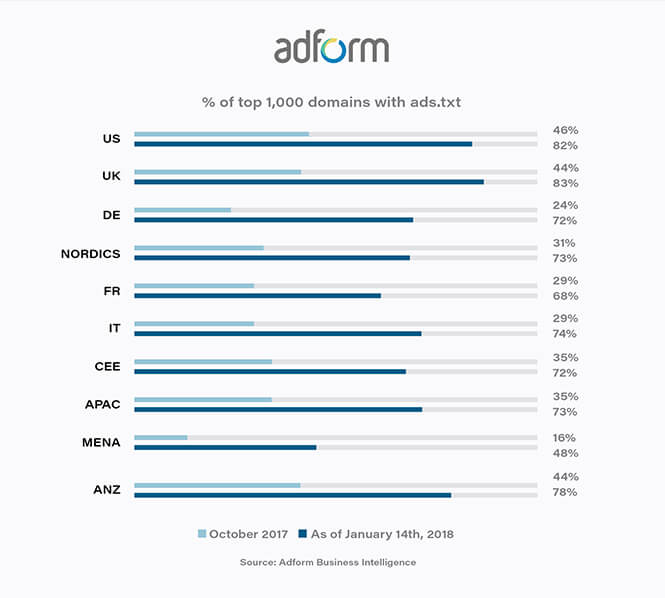New Adform study: Ads.txt is reaching ‘universal pickup’
In the US, 82 percent of top US publishers on the Adform ad tech platform employ ads.txt. Globally, it’s 70 percent.
It appears that ads.txt is reaching a critical mass among major publishers.
A new analysis released this week by Adform of the top 1,000 global sites on its ad tech platform finds that average adoption has now reached over 70 percent. In the US, it’s now 82 percent.
In a blog post, Adform wrote:
… it is clear that not only has adoption hit its stride but that we are seeing universal pickup which is rapidly accelerating. More than that, three out of every four of the top 1,000 publishers are now ads.txt enabled meaning we have crossed an important threshold in adoption and reached critical mass.
Released last June by the Interactive Advertising Bureau’s Tech Lab, ads.txt is a text document that publishers post on the root domain of their websites. In addition to its obvious reference to advertising, “ads” in ads.txt stands for “Authorized Digital Sellers.”
It presents the only sellers authorized to represent that publisher’s advertising inventory, including their seller account ID. If widely used, it could put a serious dent in sellers who fraudulently represent, for instance, that they sell space on The New York Times’s website.
But adoption has been slow. An analysis in August by MarTech Today of the 500 most-trafficked US-based sites, according to Amazon’s web analytics service Alexa, showed an adoption of 6.8 percent, or 34 sites. The adopters were primarily major publishers like the Times, The Washington Post, ESPN, Forbes, Business Insider and others.
By October, Adform found a higher adoption rate among the top 1,000 in global markets on its platform, but it was still substantially less than a majority — 30 percent. But in the US, it found a nearly 50 percent adoption by that month.
After the end of this month, the company said, its demand side platform will no longer list requests from sellers not specified in those publishers’ ads.txt files.
Contributing authors are invited to create content for MarTech and are chosen for their expertise and contribution to the martech community. Our contributors work under the oversight of the editorial staff and contributions are checked for quality and relevance to our readers. The opinions they express are their own.
Related stories

